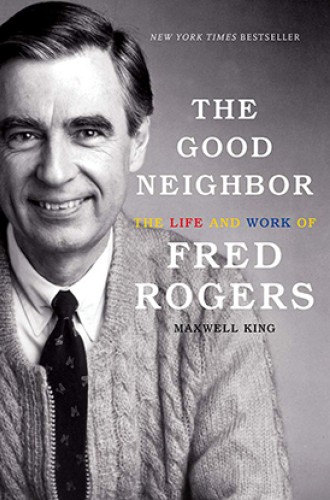Fred Rogers was the first ordained Presbyterian minister to fulfill his calling through a television program designed for children. When he was ordained in 1963, according to Maxwell King’s biography, the elders of the local presbytery did not see the value of the new medium. They wanted Rogers to be an assistant pastor and work his way up to a senior position in a church, not to work in television. Finally, according to a friend of Rogers quoted in the book, the elders relented and allowed the young minister the assignment he sought. But they refused to direct any church resources toward Rogers’s television ministry.
Nevertheless, Rogers brought his spiritual and humane values to the screen, first in a show with the Canadian Broadcasting Corporation and then at the Pittsburgh public television station WQED. Morgan Neville’s 2018 documentary film, Won’t You Be My Neighbor?, shows how Rogers communicated love, kindness, and acceptance, occasionally in ways that were ahead of his time. There are few times when I recommend a movie over a book, but this is one of them. King’s biography simply doesn’t capture the whole of the man—his charm, along with what made him unique—in the same way Neville’s film does. Because Rogers was at heart a screen personality, it makes sense that the values he presented so whimsically with music and puppets would be most effectively conveyed on the screen.
Read our latest issue or browse back issues.
The biography’s main flaw, however, isn’t its medium. It is its overly hagiographic tone. King once directed the Fred Rogers Center for Early Learning and Children’s Media in Latrobe, Pennsylvania. Latrobe is the town where Rogers was born into a wealthy family that had made its fortune selling bricks, and it’s where he is buried. King says in the acknowledgments that he was convinced to write the book by Rogers’s widow, Joanne. At no point does the biographer (or anyone he interviews) ever criticize Rogers, even about details that some might find unsettling.
The book would have benefited from a more complex sense of how Rogers negotiated his economic privilege. When CBS wanted to bring Rogers’s first television show, The Children’s Corner, into its network, for example, he refused because he did not want his show to contain advertisements for children. Rogers, with his inherited family fortune, never needed to work to support his family. But his staff members weren’t wealthy: they had families to support. King doesn’t speculate about the economic impact of this decision on the show’s staff members.
The biography also misses opportunities to provide a complex picture of who Rogers was as a parent. King tells occasional anecdotes that complicate the book’s rather simplistic portrayal of Rogers’s views on discipline. For example, in the mid-1970s, King reports, Rogers’s sons grew marijuana in a corner of the basement of their house. When Rogers found the crop, he destroyed it. Here King misses an opportunity to provide deeper analysis. How did Rogers, whom King considers a model for parents, negotiate the complexities of parenting in the face of his own children’s drug use?
The Good Neighbor contains a great deal of information, and for those who are devoted fans of Mr. Rogers, it is certainly worthwhile. For those interested in the early history of television, King provides valuable insight into how programming decisions were made as different entertainment models evolved. The book also paints a textured portrait of life in Latrobe (which was essentially a company town run by Rogers’s family) and shows how the wealth Rogers inherited assisted him throughout his life.
King includes multiple interviews and stories about people’s encounters with Rogers. For example, the cellist Yo-Yo Ma recounts his first visit with Rogers on the set of Mr. Rogers’ Neighborhood. Rogers asked Ma, “What do you feel? What would you play if you were sad, or happy, or angry?” Ma explains that the genius of these questions was that they immersed him into the world of the children, which then enabled the children to be curious about the world of music. Ma says of Rogers, “He never talks down to kids. It’s a relationship that’s based on love and respect, with boundaries.”
Stories like this convey some of who the man was. But there can be tedium in reading endless stories of Rogers’s generosity and compassion. To get a media personality onto the page in a way that speaks to readers, it helps to remember that nobody—not even the “genius of empathy,” as King describes Rogers—is perfect.







